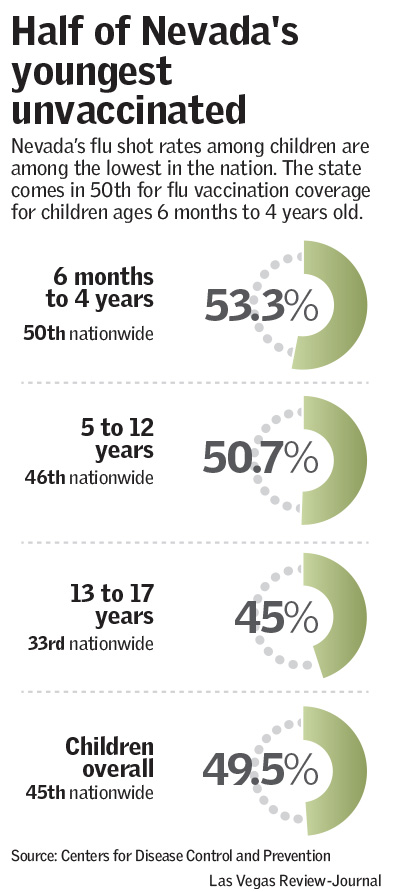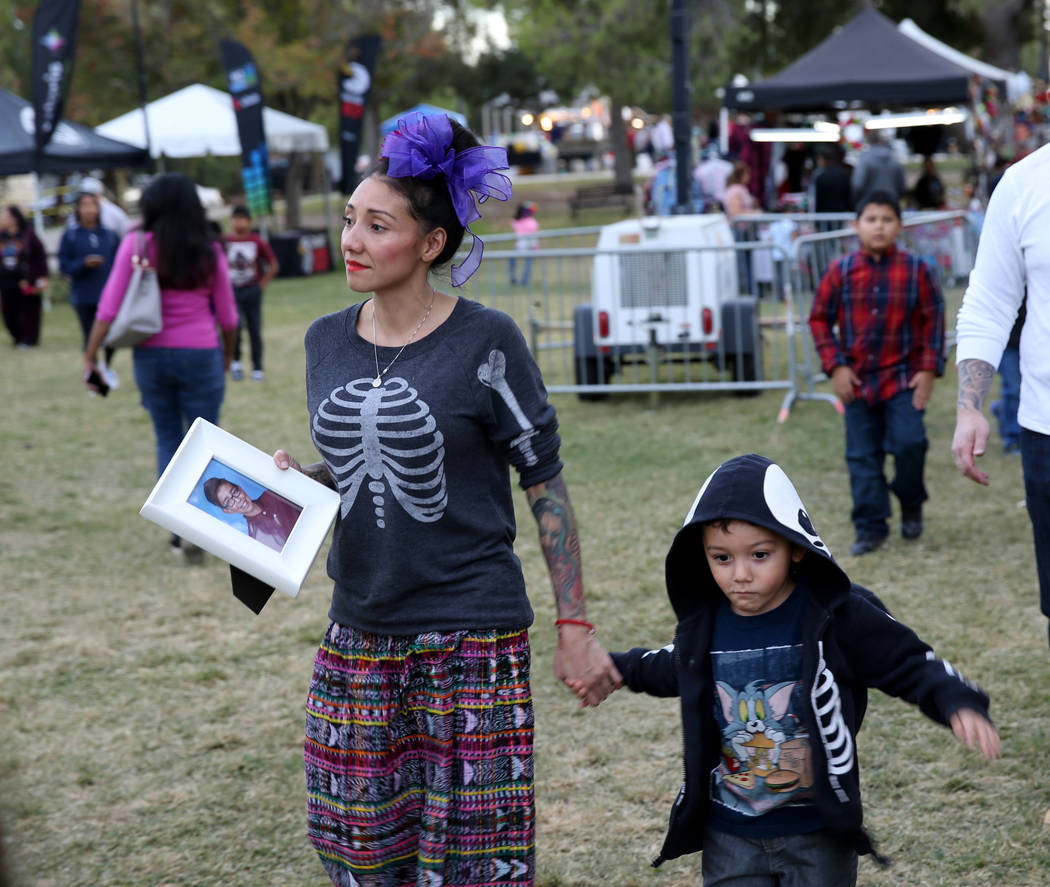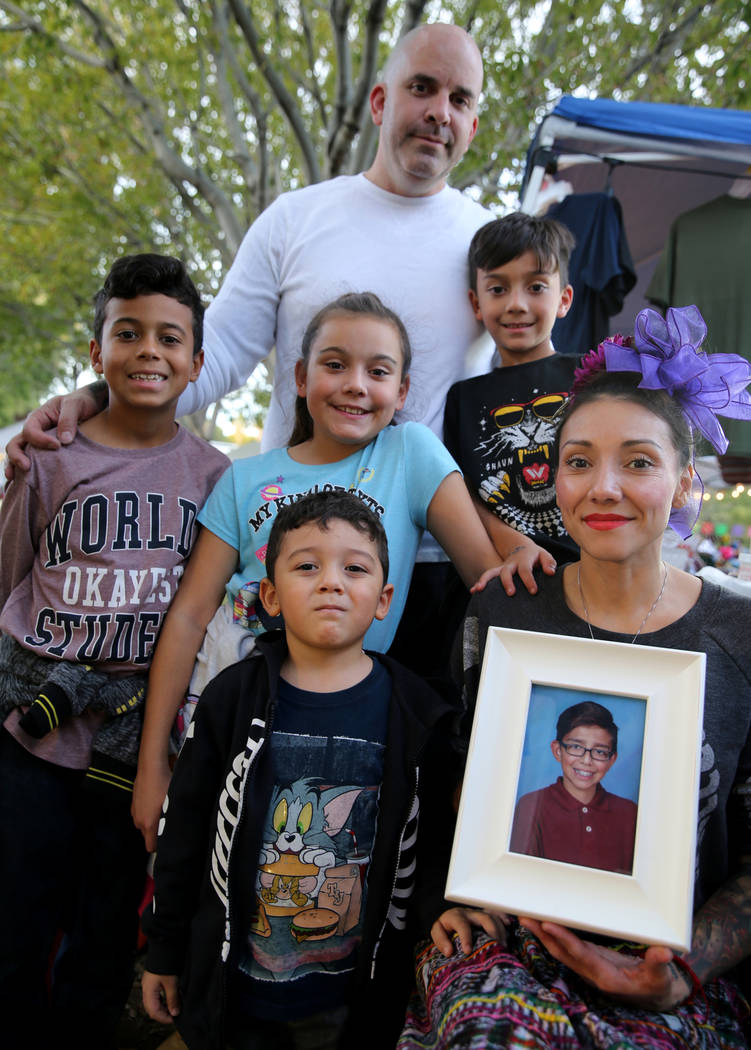Taught by tragedy, Las Vegas mom now a stickler for flu vaccinations
Every time Brenda Occhipinti drives past Centennial Hills Hospital she feels the anguish of losing her 12-year-old son, Carlo Jr., or “Junior” for short.
It hits her on the 30th of every month, the day he became one of three children and 57 adults in Southern Nevada to die from the flu during last year’s deadly season. And memories of the trauma of holding her son as blood streamed from his mouth can unexpectedly be triggered by all sorts of other stimuli.
“We’re just taking it one day at a time, honestly,” the Las Vegas mother of six, who has gone through a divorce and been receiving counseling in the 10 months since she buried her son, said this week.
The terrible loss has opened Occhipinti’s eyes to the risks of leaving children unvaccinated, as Carlo was, and she made sure his five surviving siblings all got their shots this year.
“Because of what happened to me and what happened to other families around the United States, I said, ‘You know what? I don’t want to take that chance,’” she said.
Last year’s flu season was exceptionally deadly, killing an estimated 80,000 Americans, including 183 children, a record high outside of the 2009 H1N1 pandemic, according to the Centers for Disease Control and Prevention. About 80 percent of those children were unvaccinated.
Nevada lags in vaccination
Despite such statistics, only about half of Nevada’s children got the flu shot last year, placing it 45th in the country for vaccination rates. For kids between the ages of 6 months and 4 years, Nevada came in last with a vaccination rate of 53.3 percent. New Jersey, in comparison, had the highest vaccination rates for that group: 83.8 percent.
“One of the main factors is misinformation,” said Heidi Parker, director for Immunize Nevada, explaining the immunization gap among Nevada’s youth. “There’s a lot of myths about the flu and about the flu shot.”
One such myth: that the flu shot causes the flu, which, scientists at the Centers for Disease Control and Prevention say isn’t possible.
“It does take a couple weeks for the flu shot to become effective,” Parker said, explaining why some people believe that. “It’s really easy to become exposed in that time.”
Some also believe a falsified study by Andrew Wakefield from 1998, which linked the measles, mumps and rubella (MMR) vaccine to autism. Additional studies have since debunked the claim.
Despite the evidence, some parents still worry about the vaccine’s ingredients, thimerosal in particular, which is safe and doesn’t cause autism, according to the CDC. And worried parents can ask their health care provider for a shot without the mercury-derived preservative if that’s still a concern.
Many others are open to vaccination, but face barriers to accessing care or don’t understand the vaccine’s potential lifesaving properties, said JoAnn Rupiper, chief administrative nurse for the Southern Nevada Health District. 
‘They’re not understanding’
Some parents, she finds, don’t want to vaccinate their children at the same time as they receive routine immunizations. Other times, she said, parents don’t take their children to the doctor annually.
“They’re not understanding how dangerous flu is for children,” she said.
Occhipinti certainly didn’t. She had never taken her children to get vaccinated before the disease killed Junior. This year, that changed.
“We just kind of thought it was a waste,” Occhipinti said of the flu shot. “We didn’t realize this could happen to us.”
The vaccine is the best tool scientists have to prevent the flu. It’s not perfect, by any means, Rupiper said. The vaccine was 40 percent effective last year, though only 25 percent against the deadline H3N2 strain.
“But I think if I could know, ‘I am doing everything I can do to prevent flu from happening in my family by taking a simple shot,’ that’s what I’m going to do,” she said. “You’ve done everything you can then.”
That’s Occhipinti’s new mindset.
“As mothers, we carry (children) in our womb. We feel them move for the first time, we connect, and when they breathe, you’re relieved,” she said. “Losing them, it’s almost like you die with them.”
Contact Jessie Bekker at jbekker@reviewjournal.com or 702-380-4563. Follow @jessiebekks on Twitter.
For yourself and others
As of Oct. 27, there have been eight hospitalizations and no confirmed deaths from the flu in Southern Nevada during the current flu season, according to health district numbers published Friday. At this time last year, 53 people had been hospitalized and one senior had died from the illness caused by a variety of influenza viruses.
Getting vaccinated doesn't just provide a degree of protection for you. It also helps shield others around you who might be more vulnerable to the illness, including the young and old, people who can't get vaccinated because of other health conditions and those who allergic to the vaccine's ingredients.
The Southern Nevada Health District's JoAnn Rupiper said she can't imagine a valid reason not to get yourself and family members vaccinated.
"I'm at a loss for words why people won't do that," she said.
Related
Free flu shots and dental care at Las Vegas health festival on Saturday





















